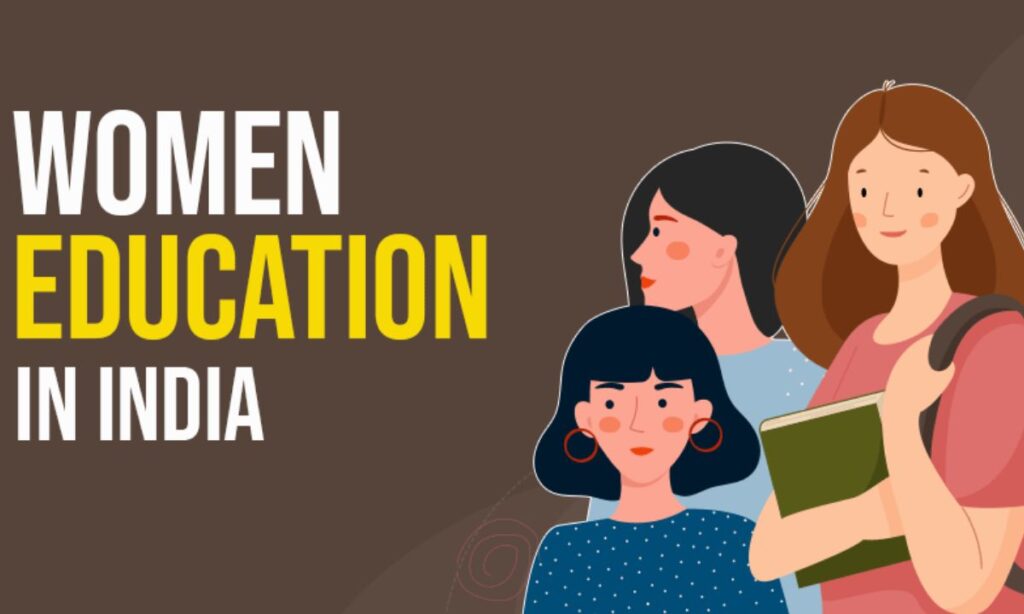What is common between Indira Gandhi, Savitribai Phule, Kamaladevi Chattopadhyay, and countless other bright stars from India? These symbols of women’s empowerment have helped to implement reformative measures to promote women education in India and continue to inspire generations of young women with their leadership skills and fierce conviction towards making an everlasting change in Indian society. Having emerged from the shadows of patriarchy and veils of stereotypical norms of Indian culture, these Indian women have explored their outstanding vision to not only liberate themselves from the shackles of narrow-mindedness but also initiate a revolution powered by education that will continue to live in the ages to come.
Due to the patriarchal nature and the staunch tendency of confining women to mainly domestic roles, it was not only the voice of the women that was silenced in the families but also their fundamental rights, which included the right to women education in India. The male children were celebrated in the family and bestowed with financial support to fund their education and opulence if the family’s income supported that. However, if mercifully allowed to live, the girl child was immediately reserved for the household chores and included in the plans to become an ideal and devoted housewife. Thus, they were forced to stay at home in the darkness of illiteracy, which robbed them of their self-esteem, desires, and even their own identity, which was permanently shadowed by the powerful males in their lives, which could be either their father, brother, husband, or son. Although some elite families preferred to have home tutors instil primary education in their daughters until they were of marriageable age, the underprivileged families brushed away any thoughts about women education in India or educating their daughters.
However, this murky sight of Indian society and the obnoxious gender discrimination towards women education in India was soon about to change, and the overcast sky of India was about to see a new ray of hope, where women could manage not only their household but also their own life through proper education. Although most women did not receive education in the pre-British era in India as the traditional pathshala and gurukuls were mainly limited to male students, it was the Charter Act of 1813 that triggered the need for women’s access to education in India, which was enacted after East India Company brought in their Wood’s Despatch to implement the Educational Development Program in the year 1854. When India celebrated its freedom in 1947, access to higher education for women was officially mandated by legislation, the Right to Education, in Article 45 of the Indian Constitution. This legislation was the beginning of women’s journey towards empowerment, as Article 45 mandated the need to educate all children with free education till the age of 14. As a result, the female literacy rate in India is almost 70.3%, which is still lower compared to the educated male population of 84.7%. Amongst the other Indian states, Kerala holds the topmost position in female literacy with 95.2%, whereas Rajasthan holds a mere 57.6%. This indicates a still prevalent discrepancy in disseminating knowledge and educational opportunities for women in India.
Nevertheless, this journey of Indian women from mere ornamentations in Indian households to influential corporate and political positions has not been a bed of roses. In a society where the only approved aspiration of girls was to be a caring and loving wife, a doting mother, and an obedient daughter-in-law, the transformative power of education has sparked a tremendous zeal to shatter the glass ceilings among women. As a result, the number of women in the fields of law enforcement, education, politics, academics, and business is continuously increasing, accelerating India’s progress towards a future that was envisioned by reformers like Raja Ram Mohan Roy, Ishwar Chandra Vidyasagar, Savitribai Phule, and Sarojini Naidu.
Some of the pioneers of women’s education in India are:
Savitribai Phule: Making a mark in history that men mostly dominate is not easy to achieve. However, the mother of feminism in India, Savitribai Phule, was an Indian female teacher who, along with her husband, Jyoti Rao Phule, relentlessly worked for the emancipation of women, fighting caste discrimination and promoting women’s education. She was a victim of child marriage, yet, with the unwavering support of her husband, she established schools for girls to embarrass them with education.
Anandi Gopal Joshi: At a time when participating in a profession exclusively dominated by men was considered to be abhorrent for women to even think of, Anandi Gopal Joshi, with her husband’s support, became the first Indian female student of Western Medicine studying the United States. Despite being married at an early age, she and her husband’s support fulfilled her dream of becoming a physician when she was appointed as the physician in charge in the female ward of the local Albert Edward Hospital.
Fatima Sheikh: With her indomitable spirit, this lady became one of India’s first female Muslim educators when she joined the cause of the Dalit girls and the forces raised by the Phules. Being from a marginalized community herself, Fatima Sheikh had to undergo insurmountable barriers to establish herself as an educationalist, and that was against the wishes of her family. She became the driving force for other Muslim women to join the field of education and lead this empowered society, both with their intellect and empathy.
Conclusion
India has seen several women perpetuating the cycle of empowerment by continuously questioning stereotypes, advocating for fair treatment and equality, especially within a traditionally male-dominated area, and also claiming the baton of leadership just like their male counterparts. Some of the names that must be mentioned include Kalpana Chawla and Sunita Williams, both of whom had selected the profession of astronaut, which could not have been possible without their excellent educational background. Also, Kiran Mazumdar, Indira Nooui, and Nirmala Sitharaman are some of the names that must be mentioned in the field of politics and business who have exhibited their tremendous potential as leaders and change-makers in society with extraordinary talent, transformative power, and advocacy for women education in India environment through education.
ALSO READ: Mastering Rewording Tips And Tools To Perfect Your Sentence Flow







